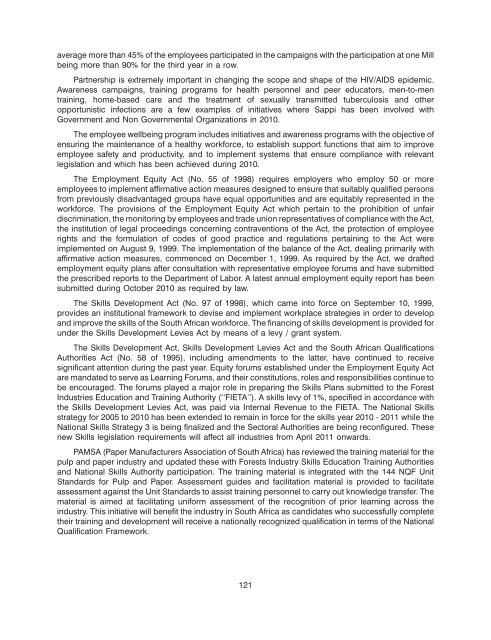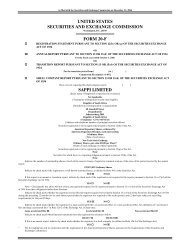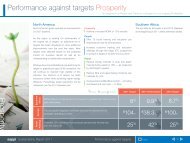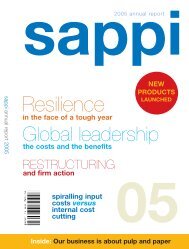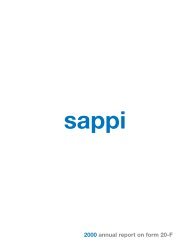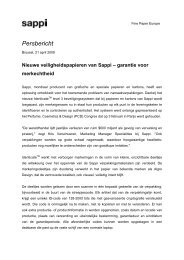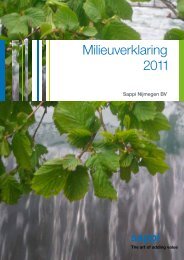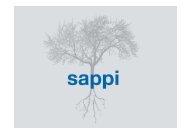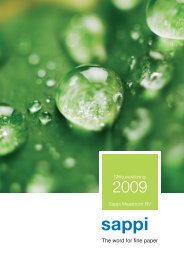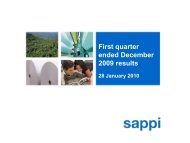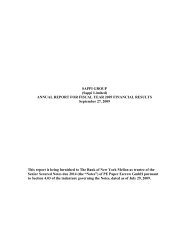You also want an ePaper? Increase the reach of your titles
YUMPU automatically turns print PDFs into web optimized ePapers that Google loves.
average more than 45% of the employees participated in the campaigns with the participation at one Mill<br />
being more than 90% for the third year in a row.<br />
Partnership is extremely important in changing the scope and shape of the HIV/AIDS epidemic.<br />
Awareness campaigns, training programs for health personnel and peer educators, men-to-men<br />
training, home-based care and the treatment of sexually transmitted tuberculosis and other<br />
opportunistic infections are a few examples of initiatives where Sappi has been involved with<br />
Government and Non Governmental Organizations in 2010.<br />
The employee wellbeing program includes initiatives and awareness programs with the objective of<br />
ensuring the maintenance of a healthy workforce, to establish support functions that aim to improve<br />
employee safety and productivity, and to implement systems that ensure compliance with relevant<br />
legislation and which has been achieved during 2010.<br />
The Employment Equity Act (No. 55 of 1998) requires employers who employ 50 or more<br />
employees to implement affirmative action measures designed to ensure that suitably qualified persons<br />
from previously disadvantaged groups have equal opportunities and are equitably represented in the<br />
workforce. The provisions of the Employment Equity Act which pertain to the prohibition of unfair<br />
discrimination, the monitoring by employees and trade union representatives of compliance with the Act,<br />
the institution of legal proceedings concerning contraventions of the Act, the protection of employee<br />
rights and the formulation of codes of good practice and regulations pertaining to the Act were<br />
implemented on August 9, 1999. The implementation of the balance of the Act, dealing primarily with<br />
affirmative action measures, commenced on December 1, 1999. As required by the Act, we drafted<br />
employment equity plans after consultation with representative employee forums and have submitted<br />
the prescribed reports to the Department of Labor. A latest annual employment equity report has been<br />
submitted during October 2010 as required by law.<br />
The Skills Development Act (No. 97 of 1998), which came into force on September 10, 1999,<br />
provides an institutional framework to devise and implement workplace strategies in order to develop<br />
and improve the skills of the South African workforce. The financing of skills development is provided for<br />
under the Skills Development Levies Act by means of a levy / grant system.<br />
The Skills Development Act, Skills Development Levies Act and the South African Qualifications<br />
Authorities Act (No. 58 of 1995), including amendments to the latter, have continued to receive<br />
significant attention during the past year. Equity forums established under the Employment Equity Act<br />
are mandated to serve as Learning Forums, and their constitutions, roles and responsibilities continue to<br />
be encouraged. The forums played a major role in preparing the Skills Plans submitted to the Forest<br />
Industries Education and Training Authority (‘‘FIETA’’). A skills levy of 1%, specified in accordance with<br />
the Skills Development Levies Act, was paid via Internal Revenue to the FIETA. The National Skills<br />
strategy for 2005 to 2010 has been extended to remain in force for the skills year 2010 - 2011 while the<br />
National Skills Strategy 3 is being finalized and the Sectoral Authorities are being reconfigured. These<br />
new Skills legislation requirements will affect all industries from April 2011 onwards.<br />
PAMSA (Paper Manufacturers Association of South Africa) has reviewed the training material for the<br />
pulp and paper industry and updated these with Forests Industry Skills Education Training Authorities<br />
and National Skills Authority participation. The training material is integrated with the 144 NQF Unit<br />
Standards for Pulp and Paper. Assessment guides and facilitation material is provided to facilitate<br />
assessment against the Unit Standards to assist training personnel to carry out knowledge transfer. The<br />
material is aimed at facilitating uniform assessment of the recognition of prior learning across the<br />
industry. This initiative will benefit the industry in South Africa as candidates who successfully complete<br />
their training and development will receive a nationally recognized qualification in terms of the National<br />
Qualification Framework.<br />
121


